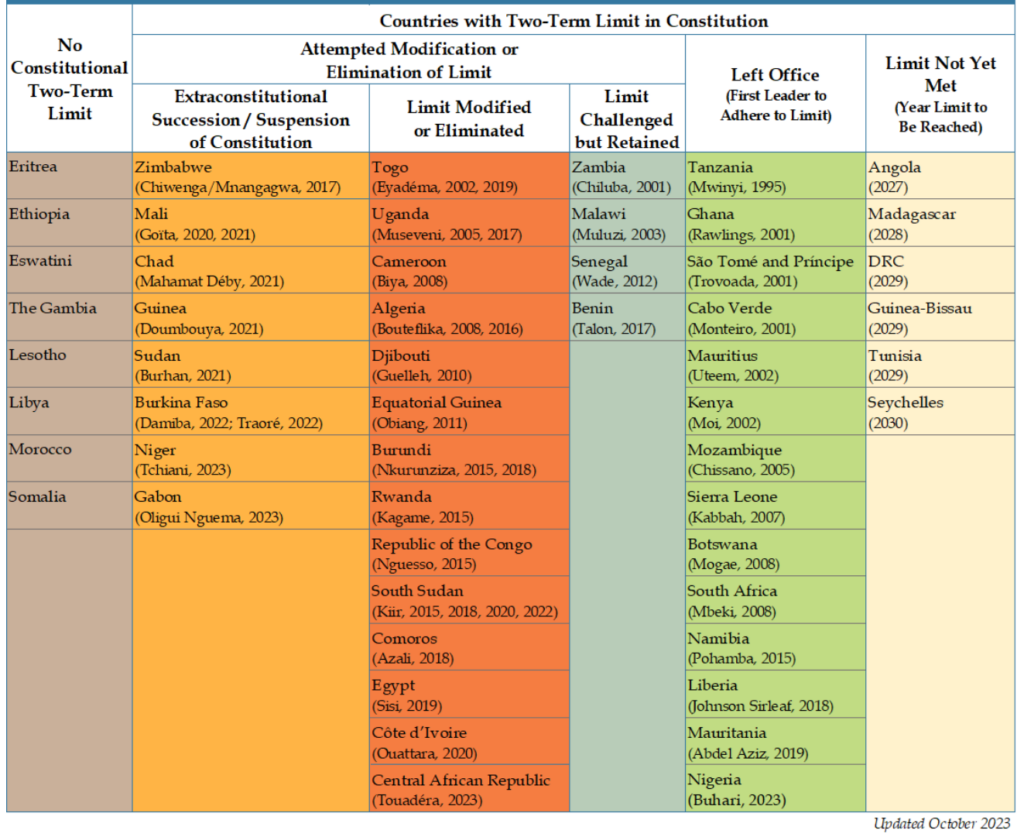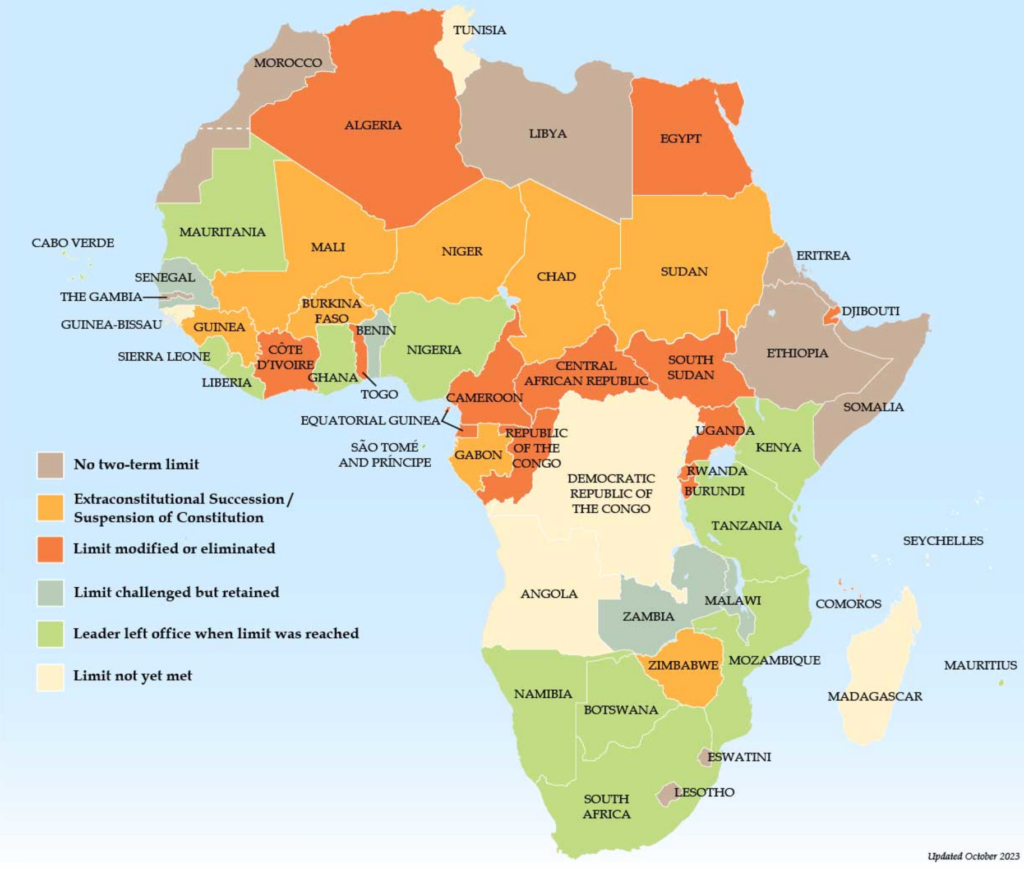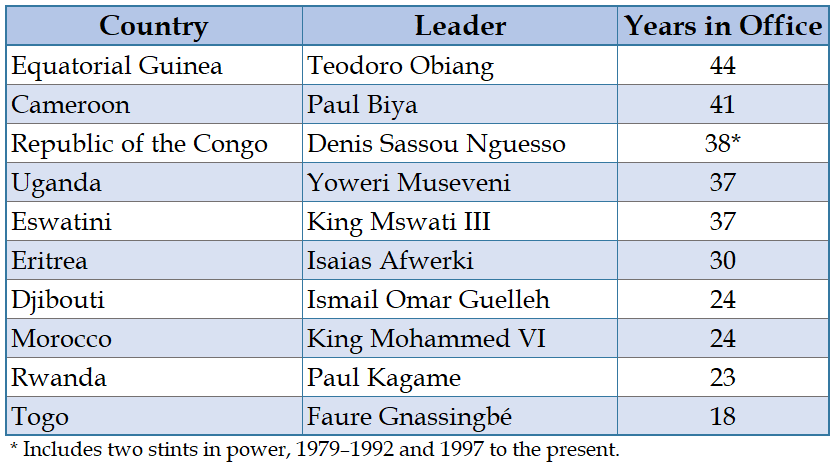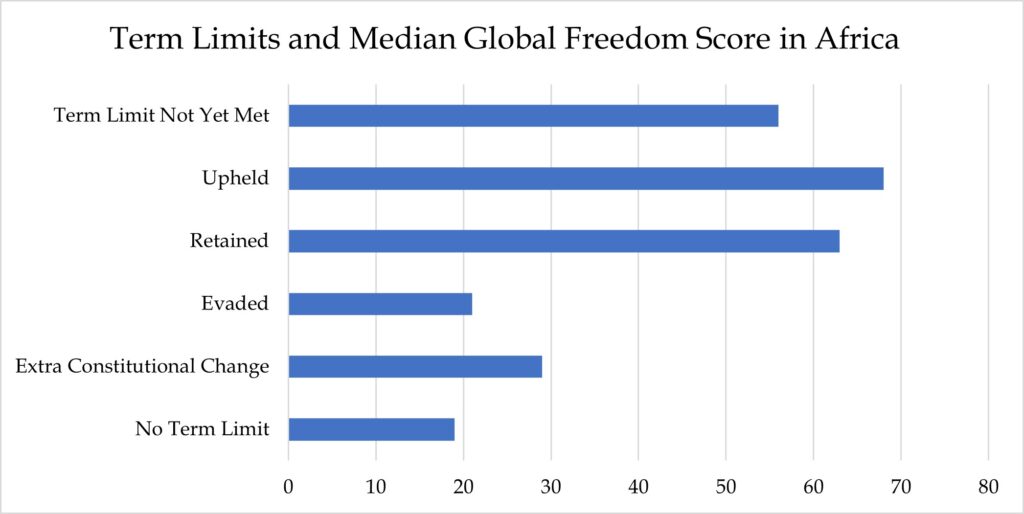Term limit evasions are at the root of a host of governance dysfunctions in Africa and are linked to higher levels of autocracy, corruption, conflict, and propensity for coups.


Highlights
- Extraconstitutional extensions of power have shaped the contours of Africa’s governance landscape in recent years. Leaders of 14 African countries have held onto power for more than two terms after evading term limits. This continues a pattern of term limit evasion observed since 2015, reversing an evolving trend of term limit adherence between 2000–2015.
- Another eight African countries have endured military coups that suspended or disrupted their constitutions since 2015. In none of these cases have the military authorities demonstrated a commitment to relinquishing power, thereby effectively eliminating term limit provisions that had been in place.
- Combined with an additional 8 countries that do not have any existing term limit restrictions, 30 out of 54 African countries (56 percent) are operating without functioning limits on an executive’s time in power.
- Notably, 18 African countries are actively upholding term limit norms, including the noteworthy case of Nigerian President Muhammadu Buhari who stepped down after his two terms in office. Another six countries have term limit restrictions on the books, though these have yet to be applied.
- Upholding term limits has direct effects on leaders’ and regimes’ longevity in power. The average time in office for the 18 leaders in countries that uphold term limits is 5 years. For the 14 leaders who have evaded term limits, the median time in office is 16 years.
- These figures understate the stranglehold on power effected by term limit evasions, however. The current authorities in Algeria and Burundi, for example, replaced longtime leaders who had previously evaded term limits. They, like the dynastic succession in Togo, represent a continuation of these regimes rather than a fresh start. When that is considered, the median time in power for regimes in the “term limit modified” category expands to 26 years.
Coup Leaders and Military Governments are Allergic to Term Limits
- Term limit evasions are also directly linked to the surge of coups observed in Africa. Five of the eight countries that have suffered coups since 2015 had leaders who evaded term limits—Chad, Gabon, Guinea, Sudan, and Zimbabwe. The median time in office for those deposed leaders was 30 years.
- This highlights that extraconstitutional actions of one type (i.e., term limit evasions) beget extraconstitutional actions of another (i.e., seizures of power via military coups).
- Africa’s recent coups should not be misinterpreted as reformist, however. Military coups that occurred within already authoritarian governments—Chad, Gabon, Sudan, and Zimbabwe—were led by actors who were a part of or worked closely with the previous regime. Accordingly, they are a continuation of the closed power structures that have dominated these countries—and disregarded term limits—for decades.
- The coups against democratically elected leaders in Niger, Mali, and Burkina Faso, furthermore, are attempts to restore military governance in countries with long (and disastrous) legacies of military rule. In each of these cases, the coups have jettisoned nascent norms of leaders respecting term limits.
- The relationship between military government and term limit evasions operates in both directions. Ten of the fourteen leaders who have evaded term limits have come to power via military coup, civil conflict, or military support. In other words, leaders who gained power through extraconstitutional means, subsequently tend to violate legal constraints on their time in power.
Damaging Implications for Governance
- The evasion of term limits is directly responsible for the prolonged tenures of certain leaders. Ten African leaders have been in power for 18 years or longer. All of these have evaded term limits or are in countries without them.

- The evasion of term limits has broader consequences for democratic governance in Africa. The median score on Freedom House’s Global Freedom Index, which measures the upholding of civil liberties and political rights, is 65 for African countries that uphold term limits (on a scale of 0–100). In countries where leaders have evaded these limits, the median score is only 21.

- The stark variation in governance scores accentuates that term limit evasions are rarely isolated events. Rather, they are typically part of a pattern of leaders undermining the rule of law and restricting civil and political liberties. The median ranking on Transparency International’s 180-country Corruption Perceptions Index is 83 for African countries that have upheld term limits. This compares to a median ranking of 142 for countries where those limits were evaded—a 60-place difference.
- Term limit evasions are linked to other serious governance failures. Just under 40 percent of countries where leaders have evaded term limits or term limits do not exist are in conflict. In contrast, just 11 percent of countries that have upheld or retained term limits are in conflict (i.e., 2 out of 18 countries, with Nigeria and Mozambique being the exceptions).
- Strong regional patterns with regards to upholding term limits are apparent. Central Africa is the locus of term limit evasions with leaders in seven countries having bypassed these limits. While West Africa has been the focal point for the surge of coups observed on the continent in recent years, the region is also a leader in upholding term limits, with eight countries having done so. This illustrates the sharply divergent visions for governance norms playing out in the region and across the continent. Southern Africa is also distinctive. With the notable exception of Zimbabwe, Southern Africa has largely institutionalized the process of executive transitions after two terms in office.

